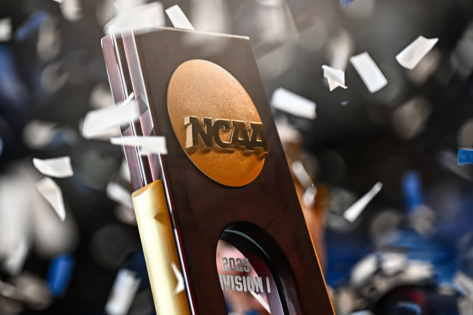“This entire process defines athlete value based on the sport you played in and how much revenue your team brought in… NIL is about more than wins and revenue,” LSU gymnastics icon Olivia Dunne remarked about the ongoing House v. NCAA settlement case. Dunne, one of the biggest NIL-era success stories, highlighted how Judge Claudia Wilken’s ruling could reshape college athletics. If the judge approves the settlement, then the NCAA will have to pay out a mind-boggling $2.8 billion in back pay to athletes.
However, as Dunne noted, the money will largely flow through revenue-generating sports. That means the biggest colleges and the most popular sports may rake in the majority of the money. Yet, Judge Wilken discussed one more thing. She also called for a “grandfather clause” to protect the athletes under the NCAA’s new roster limits. So, Congressman Michael Baumgartner took the U.S. District Court judge’s suggestion to heart and took them one step further, filing a shocking reform bill.
No more NCAA?
Just before March Madness tipped off, Congressman Michael Baumgartner introduced the Restore College Sports Act bill. “Tonight is the NCAA championship, but the magic of March Madness is gone. There’s no upsets, no Cinderellas. Just bigger brands with bigger budgets,” he said, as per The Spokesman-Review. In light of the NIL-roster limit controversy, the Baumgartner bill proposed the NCAA’s removal.
That’s right. The Restore College Sports Act aims to replace the NCAA with the American College Sports Association. While the ACSA will technically serve the same purpose as the NCAA, the formation of the ACSA will also lead to a complete overhaul of the current system. That means a major shakeup of the entire college sports landscape.
The bill is so sweeping that it could reshape the NIL program and even impact powerhouse colleges. Baumgartner’s bill hopes to do away with the very concept of power conferences and high revenue-generating schools, dividing the NIL dollars and revenue “equally among all student-athletes of such institutions within the ACSA.”
And if you thought this was big, the Restore College Sports Act had more in store. The ever-so-familiar transfer windows? Closed forever. The new bill suggested unlimited transfers, giving athletes the mobility to decide when they want to transfer. However, he has his reasons for proposing such a change. Take Luke Kalarickal’s case, for example.
Kalarickal, who ran at the NCAA level, felt the crush of the new roster limit set in during his sophomore year. Why? Because he was one of the five runners at his university, he was cut while striking the track and field roster. “Coach said we will all have a special waiver to get into the transfer portal. He cut us two weeks before school started. How are we supposed to transfer?” The student-athlete told Yahoo Sports.
Luke Kalarickal is just among the thousands of athletes getting affected by the limits, and it’s one of the reasons why legal proceedings against the NCAA started in the first place. So, alongside suggesting these changes, the bill included a cause seeking equal revenue sharing among athletes and schools. Finally, Representative Michael Baumgartner’s bill aimed at coaches’ salaries.
If implemented, salaries would get capped at “10 times the full cost of attendance at such (ACSA) institutions,” stated the Restore College Sports Act. However, the shocking bill has already raised concerns.
Michael Baumgartner’s bill stirs the pot
Boise State’s Assistant Professor of Legal Studies, Sam Ehrlich, explained how the massive overhauls were unlike any other NIL-related bill, proposed or otherwise. Ehrlich explained that no other bill proposed taking away so much of the NCAA’s “power” in one fell swoop. “The NCAA will be furious about it,” he told The Spokesman-Review. In fact, it would be even more historic than the $2.8 billion payout.
However, not everyone was so neutral in their assessment of the Congressman’s bill. Darren Heitner didn’t like the idea of tearing down the entire NCAA system. He objected to the revenue-sharing proposal as incompatible with NIL’s original intent, as well. Heitner said that the bill “undermines the very concept of name, image and likeness rights” because not all athletes are equally popular.
“Should a star quarterback who generates millions in jersey sales now subsidize every athlete at every institution? That’s not equity,” added Heitner. He was also critical of the coaches’ salary cap. However, Michael Baumgartner saw things differently. As the Congressman mentioned while introducing the bill, he saw the NCAA system as “broken.”
Baumgartner’s main aim is to bring equality to a landscape that he believes has turned into a monopoly for universities that are part of the power conferences. The Spokane resident lamented how the best colleges generate the most revenue and have the best athletes. Meanwhile, public universities often miss out on “the same kind of fair competition rules that Congress has supported for professional sports,” said Baumgartner.
At the end of the day, the Republicans believe that the Restore College Sports Act will help establish a new system. Unlike the present NCAA system, it will function to bring quality back to the entire college sports landscape. The congressman envisions a system that won’t divide success based on “fame, position, or sport.” Yet, what do you think? Do you believe putting guardrails around the current NCAA system will be enough? Or does college athletics need something like the Restore College Sports Act? Write your views in the comments.
The post NCAA Hit With Shocking New House Bill While NIL Controversy Continues to Raise Concerns appeared first on EssentiallySports.
